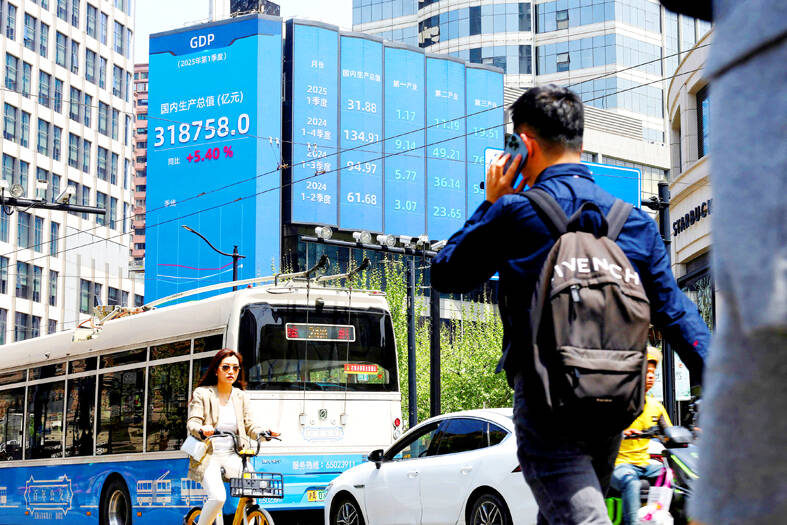Forecast-beating growth in China’s first quarter might have offered Beijing’s economic planners some much-needed good news, but analysts said they should strap in for tariff-induced woes further down the line.
The Chinese National Bureau of Statistics yesterday said the world’s No. 2 economy expanded 5.4 percent year-on-year in the January-to-March period, helped by a surge in exports. That was above the 5.1 percent predicted by analysts polled by Agence France-Presse.
Retail sales, a key gauge of consumer demand, rose 4.6 percent year-on-year, the bureau said — exceeding expectations following greater efforts by Beijing to boost consumer demand after years of weak spending.

Photo: Reuters
Meanwhile, industrial output soared 6.5 percent in the first quarter of the year, up from 5.7 percent in the final three months of last year.
However, observers said the bulk of that came from “frontloading” as businesses rushed to ship goods out of the factory before US President Donald Trump’s trade blitz kicked in.
While state efforts to boost lagging consumption — for months a drag on growth — played a role in the growth boost, the outlook remained uncertain, observers said.
“It’s too early to interpret this strength as a sign of lasting market recovery,” Economist Intelligence Unit principal economist Yue Su (蘇月) said.
“The strong performance has been driven by trade frontloading ahead of anticipated tariffs and a policy-driven rebound in consumption — particularly in electronics and home appliances,” she added.
Tit-for-tat exchanges have seen US levies imposed on China rise to 145 percent, and Beijing setting a retaliatory 125 percent toll on imports from the US.
Trump has said the ball is in China’s court if it wants to find a way out and Beijing has, in turn, vowed to “fight to the end” in a trade dispute that shows few signs of letting up.
In the face of those global trade headwinds, Beijing yesterday said it would appoint Li Chenggang (李成鋼), a former Chinese representative to the WTO in Geneva, Switzerland, as its top trade envoy.
“The escalation happening in April is going to be felt in the second-quarter figures as the tariffs will send stateside firms looking to other suppliers, impeding Chinese exports and slamming the brakes on investment,” Moody’s Analytics economist Heron Lim (林師順) said.
“This will hit electronics makers and exporters the hardest, as their products dominate China’s US-bound exports,” he said.
Oxford Economics Ltd economist Louise Loo (盧姿蕙) said that “the improvement in growth momentum is very likely to be short-circuited in the coming months by the incoming headwinds of punitive tariffs.”
Beijing said the global economic environment was becoming more “complex and severe,” and that “proactive and effective macro policies” were needed to boost growth and consumption.
“The foundation for sustained economic recovery and growth is yet to be consolidated,” the bureau said.
China’s top leaders last month set an ambitious annual growth target of about 5 percent, although many economists consider that goal to be ambitious given the problems facing the economy.
Insights into how that stimulus could work could emerge from an expected meeting of the Politburo Standing Committee of the Chinese Communist Party, country’s top decisionmaking body.
“We continue to anticipate a US$2 trillion stimulus package focused on consumption, infrastructure, urban renewal and shantytown renovation,” Su said. “Challenges to China’s economy remain significant over the coming quarters.”

In Italy’s storied gold-making hubs, jewelers are reworking their designs to trim gold content as they race to blunt the effect of record prices and appeal to shoppers watching their budgets. Gold prices hit a record high on Thursday, surging near US$5,600 an ounce, more than double a year ago as geopolitical concerns and jitters over trade pushed investors toward the safe-haven asset. The rally is putting undue pressure on small artisans as they face mounting demands from customers, including international brands, to produce cheaper items, from signature pieces to wedding rings, according to interviews with four independent jewelers in Italy’s main

Japanese Prime Minister Sanae Takaichi has talked up the benefits of a weaker yen in a campaign speech, adopting a tone at odds with her finance ministry, which has refused to rule out any options to counter excessive foreign exchange volatility. Takaichi later softened her stance, saying she did not have a preference for the yen’s direction. “People say the weak yen is bad right now, but for export industries, it’s a major opportunity,” Takaichi said on Saturday at a rally for Liberal Democratic Party candidate Daishiro Yamagiwa in Kanagawa Prefecture ahead of a snap election on Sunday. “Whether it’s selling food or

CONCERNS: Tech companies investing in AI businesses that purchase their products have raised questions among investors that they are artificially propping up demand Nvidia Corp chief executive officer Jensen Huang (黃仁勳) on Saturday said that the company would be participating in OpenAI’s latest funding round, describing it as potentially “the largest investment we’ve ever made.” “We will invest a great deal of money,” Huang told reporters while visiting Taipei. “I believe in OpenAI. The work that they do is incredible. They’re one of the most consequential companies of our time.” Huang did not say exactly how much Nvidia might contribute, but described the investment as “huge.” “Let Sam announce how much he’s going to raise — it’s for him to decide,” Huang said, referring to OpenAI

Nvidia Corp’s negotiations to invest as much as US$100 billion in OpenAI have broken down, the Wall Street Journal (WSJ) reported, exposing a potential rift between two of the most powerful companies in the artificial intelligence (AI) industry. The discussions stalled after some inside Nvidia expressed concerns about the transaction, the WSJ reported, citing unidentified people familiar with the deliberations. OpenAI makes the popular chatbot ChatGPT, while Nvidia dominates the market for AI processors that help develop such software. The companies announced the agreement in September last year, saying at the time that they had signed a letter of intent for a strategic